AMD Zen 3 Ryzen Deep Dive Review: 5950X, 5900X, 5800X and 5600X Tested
by Dr. Ian Cutress on November 5, 2020 9:01 AM ESTCPU Tests: Synthetic
Most of the people in our industry have a love/hate relationship when it comes to synthetic tests. On the one hand, they’re often good for quick summaries of performance and are easy to use, but most of the time the tests aren’t related to any real software. Synthetic tests are often very good at burrowing down to a specific set of instructions and maximizing the performance out of those. Due to requests from a number of our readers, we have the following synthetic tests.
Linux OpenSSL Speed: SHA256
One of our readers reached out in early 2020 and stated that he was interested in looking at OpenSSL hashing rates in Linux. Luckily OpenSSL in Linux has a function called ‘speed’ that allows the user to determine how fast the system is for any given hashing algorithm, as well as signing and verifying messages.
OpenSSL offers a lot of algorithms to choose from, and based on a quick Twitter poll, we narrowed it down to the following:
- rsa2048 sign and rsa2048 verify
- sha256 at 8K block size
- md5 at 8K block size
For each of these tests, we run them in single thread and multithreaded mode. All the graphs are in our benchmark database, Bench, and we use the sha256 and md5 results in published reviews.
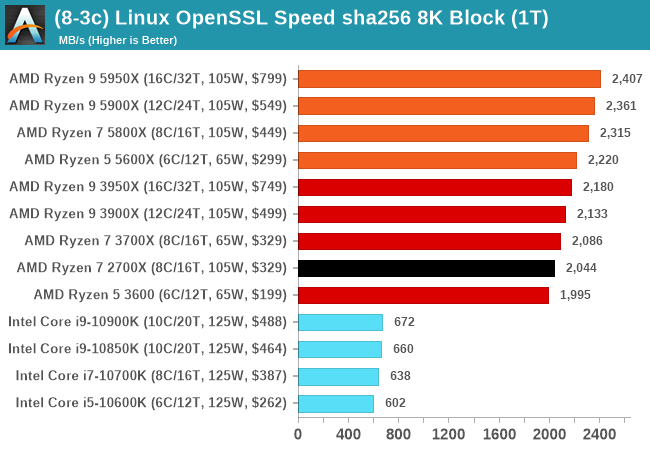
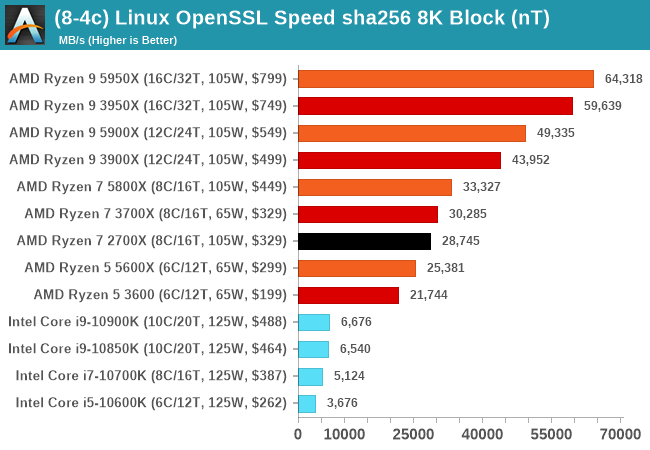
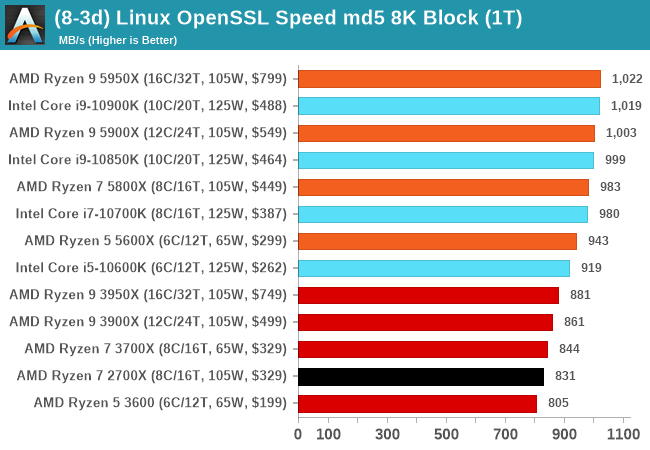
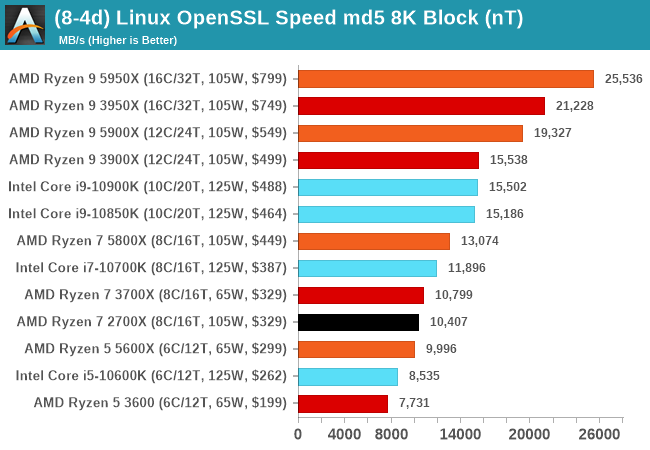
GeekBench 5: Link
As a common tool for cross-platform testing between mobile, PC, and Mac, GeekBench is an ultimate exercise in synthetic testing across a range of algorithms looking for peak throughput. Tests include encryption, compression, fast Fourier transform, memory operations, n-body physics, matrix operations, histogram manipulation, and HTML parsing.
I’m including this test due to popular demand, although the results do come across as overly synthetic, and a lot of users often put a lot of weight behind the test due to the fact that it is compiled across different platforms (although with different compilers).
We have both GB5 and GB4 results in our benchmark database. GB5 was introduced to our test suite after already having tested ~25 CPUs, and so the results are a little sporadic by comparison. These spots will be filled in when we retest any of the CPUs.
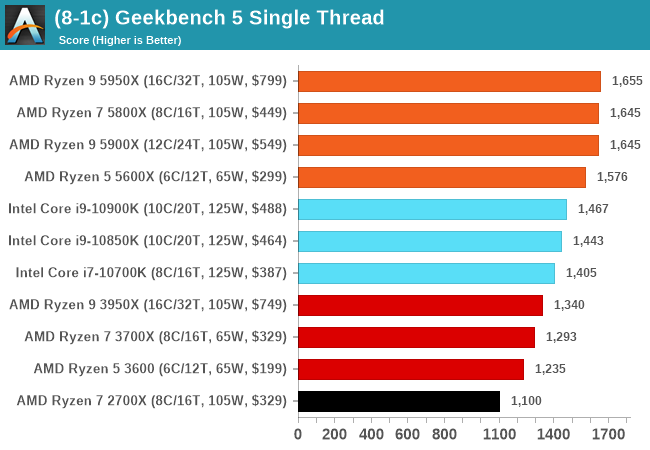
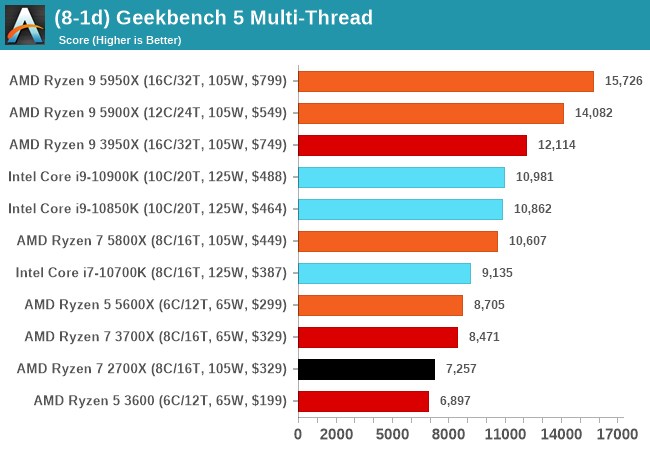










339 Comments
View All Comments
Threska - Monday, November 16, 2020 - link
Depends upon advantage.https://www.fool.com/investing/2020/11/16/nvidia-l...
FreckledTrout - Thursday, November 5, 2020 - link
AMD finally has an Intel beater on its hands at least until Rocket Lake arrives. Having actual competition is going to be great computing. Nice review.duploxxx - Saturday, November 7, 2020 - link
nothing confirmed on Rocket Lake...fishy results with a so-called avg turbo ghz which actually shows it was doing 5ghz.
a total unknown release date, expected at the end of Q1 2021 on a dead platform with some kind of pcie-4 . yeah really looking forward.
Spunjji - Sunday, November 8, 2020 - link
They'd have to get north of 5.3Ghz consistently to beat AMD.I just don't think they can, which would make the product pretty hilarious - big die, lots of heat, no performance crown.
hbsource - Thursday, November 5, 2020 - link
Very impressive. I think I'm good with my 3950X until the next socket but the single thread uplift is very tempting.FireSnake - Thursday, November 5, 2020 - link
@Ian:"With AMD taking the performance crown in almost area it’s competing in"
Should this be:
"With AMD taking the performance crown in almost every area it’s competing in" ... missing every?
charlesg - Thursday, November 5, 2020 - link
Now to just find the 5950 in stock at NewEgg!faizoff - Thursday, November 5, 2020 - link
Quick question on encoding with Handbrake, the 4k encoding and even the others for that matter, what preset are they run? like fast, medium, slow? and what RF count are the encodes set to? Sorry if I missed those, don't see them at a glance. Amazing review as always. Best tech deep dive for me, I love to read the architectural breakdown.GeoffreyA - Monday, November 9, 2020 - link
I think AT is using Handbrake's presets: (a) Discord Nitro 480p30, (b) Vimeo YouTube 720p30, and (c) HEVC 2160p60. I went through them now and here are the settings:A) Medium, CRF = 21
B) Medium, CRF = 22
C) Slow, CRF = 24
If you were looking for the reference frames, they are 3, 1, and 4. And there's a possibility Anandtech might have altered the presets.
DigitalFreak - Thursday, November 5, 2020 - link
Does Purch require you to use at least one bad pun in every article?